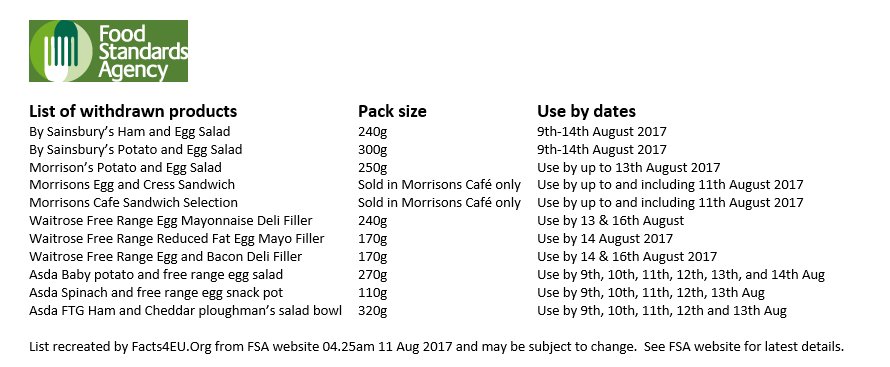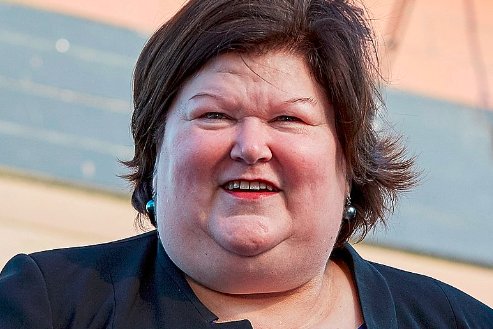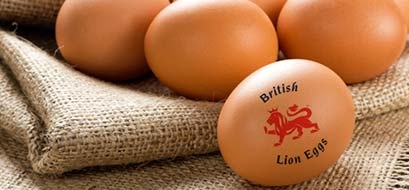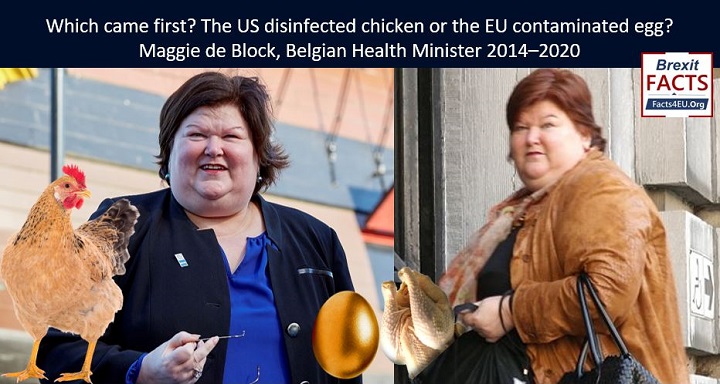EU's food safety standards have been poor for years
Millions of contaminated EU eggs, EU pus-infected pork, chlorine-washed EU fruit and veg - the list goes on...
Montage © Facts4EU.Org 2024, featuring Maggie de Block, Belgian Health Minister until Oct 2020
When it comes to food hygiene, the EU and Rejoiners should come clean
With social media full of Rejoiners saying they won't buy UK supermarket products with packaging which now says "Not For EU" because it implies UK food safety standards are not as good as the EU's, we bring them the story of millions of contaminated EU eggs... and chlorine-washed EU fruit and veg.
This comes on top of our report in Part I on the appalling situation in the EU on pus-infected pork meat.
A Brexit Facts4EU.Org Series
Part I – The EU’s food safety standards are lower than those in the UK
Part II - The EU’s chicken and egg scandal - This report
Part III - The EU’s appalling standards on animal welfare
Ask a British person how they like their eggs and they will come up with a variety of answers. Boiled, fried, poached, scrambled, and many variations thereof. The one answer you are highly unlikely to hear is “contaminated”. Yet this is precisely what EU producers served up to UK consumers six years ago.
If "you are what you eat", then food hygiene is an important topic
Food hygiene is a complex subject but it all comes down to one thing. We want to buy and eat healthy food which is not going to make us ill, or kill us in the long term because of the use of chemicals.
Unsurprisingly, EU laws and regulations on food production and sale are epic in their scope. What matters, however, is not the hundreds of thousands of words in EU documents but what we ultimately put in our mouths.
Rejoiner MPs and campaigners might wish to think about the following, before they next speak about good British produce labelled “Not For EU”. They might also reflect on the fact that this label is only becoming necessary this year as a result of the EU's egregious N.I. Protocol and the Windsor Framework, which Rishi Sunak meekly signed up to last year.
Brexit Facts4EU.Org Summary
The great EU, Belgian, and Dutch egg scandal
- In 2017, 700,000 contaminated eggs from Belgium and Holland made it into the UK’s food chain
- A variety of egg products had to be pulled from the shelves at Sainsbury's, Waitrose, Morrisons and Asda
- A massive scandal in the EU, but barely reported in the UK
Contaminated EU eggs
In 2017, the UK's Food Standards Agency (FSA) discovered that around 700,000 contaminated eggs from Belgium and Holland had made it into the UK’s food chain. Here is the information we produced at the time:-

© Brexit Facts4EU.Org 2024
The UK Food Standards Agency's statement said :
“Some of the products made from these eggs will have had a short shelf life and will have already been consumed, however, we identified some that were still within the expiry date. These are now being withdrawn by the businesses involved. Attached is a list of products we have identified to date and we will update this list as our investigations proceed.”
EU bodies, Belgium, and the Netherlands accused each other of complicity
The Belgian Health Minister at the time
The office of the then Belgian Health Minister Maggie de Block claimed that they had alerted the EU on 6th July (2017) and that Dutch authorities had known about the contamination as long ago as November 2016. The Netherlands Food Safety Agency (NVWA) denied this but was less clear about why it had not alerted authorities in June 2017 when the accusations resurfaced.
Photo: Former Belgian Health Minister Maggie de Block

It then emerged that Dutch police had arrested two directors of a Dutch company in connection with the scandal.
EU Commission: 'Nothing to do with us'
Meanwhile the EU itself could not fully deny claims from Belgium that it had been told about the problem in early July 2017. On 10 August 2017 the EU Commission said:
“On July 6, there was a bilateral exchange between Belgium and the Netherlands within the framework of the so-called administrative support and cooperation system. The Commission does not actively monitor the exchange in the AAC as is the case with the Rapid Alert System for Food and Feed (RASFF).”
In effect, the Commission wanted to distance itself from the growing crisis, which involved millions of eggs in the EU, hundreds of thousands of which had made it into the UK's food chain.
Chlorinated food? No problem if it's produced in the EU
Brexit Facts4EU.Org Summary
The EU permits chlorine-washed fruit and vegetables
- The EU permits chlorine-washed fruit and vegetables
- The industrial washing of fresh fruit and vegetables is permitted in the EU
- Next time Rejoiner MPs and campaigners open a bag of prepared lettuce from Spain, they may wish to give that some thought
Imported food products from around the world into the EU – many offenders
Imported food products from outside the EU must comply with EU regulations, but of course only a small proportion are inspected. Over time, serial offenders may become subject to stricter controls.
To give readers some idea of the types of contaminated products which made it into our food chain while the UK was a member of the EU, below is a list of just some of them.
Brexit Facts4EU.Org Summary
Since July 2018 the following processed fruit and vegetables
have been on the UK’s stricter inspection list:
- Preserved apricots from Turkey and Uzbekistan (increased control on presence of Sulphites)
- Dried apricots from Turkey and Uzbekistan (increased control on presence of Sulphites)
- Dried lemons from Turkey (increased control for presence of Pesticide residues)
- Frozen raspberries from Serbia (increased control on presence of Norovirus)
- Frozen sweet peppers from the Dominican Republic, Egypt, India and Turkey (increased control on presence of pesticide residues)
- Frozen other peppers from the Dominican Republic, Egypt, Thailand, India, Pakistan and Vietnam (increased control on presence of pesticide residues)
- Peanut butter from Bolivia, Gambia, Madagascar, Sudan and Senegal (increased control on presence of Aflatoxins)
- Groundnuts (peanuts) from Bolivia, Gambia, Madagascar, Sudan and Senegal (increased control on presence of Aflatoxins)
- Hazelnuts from Georgia (increased control on presence of Aflatoxins)
- Pistachios from the United States (increased control on presence of Aflatoxins)
- Dried goji berries from China (increased control on presence of pesticide residues)
- Frozen okra from India and Vietnam (increased control on presence of pesticide residues)
- Preserved turnips from Lebanon and Syria (increased control on presence of rhodamine B)
- Dried peppers from Sri Lanka (increased control on presence of aflatoxins)
- Dried grapes from Turkey (increased control on presence of ochratoxin A)
- Preserved vine leaves from Turkey (increased control on presence of pesticide residues)
These were all put on an EU Regulation, but only after they had been imported for a considerable period. They were not banned, merely subject to closer supervision.
Observations

British Lion stamp of quality on eggs
Egg-xit?
Can you imagine what the EU itself would have done if it had been British eggs that were contaminated? We have absolutely no doubt that a total ban on UK egg exports would have been imposed by the EU Commission - within hours.
It's a shame that the very high standards of food production in the UK, often far higher than in most EU countries, are not more widely celebrated by the government and the British media.
For Rejoiners to be all over social media saying they won't buy products marked "Not For EU" because it means that the UK's food safety standards are lower than in the EU, we hope this report has been instructive.
All countries have food hygiene issues from time to time but the EU's have sometimes been on an epic scale, as in our example above. And when it comes to the EU's ban on US chlorine-washed chicken, why are they happy to have chlorine-washed EU produce in the shops? Rejoiners think that because the EU bans US chicken, it must be bad. Why does the EU ban it? Mainly to protect its industrial-scale chicken factories.
It’s worth noting that the EU’s principal objection to chlorine-washed chicken from the US is not the process itself, but their claim that chlorine-washing makes US producers less likely to worry about the hygiene of their birds before they are packaged. Why do they not apply the same approach to EU-produced, chlorine-washed fruit and vegetables?
We suggest that the EU goes to look at chicken factories in its own backyard, if it is concerned about the welfare of birds before chicken meat goes to market.
If you have not yet supported our work with a donation, may we ask you to consider this today? We really need your help. You can make a secure and quick donation methods here. We badly need more donations to keep going in this important years for sovereignty, democracy and freedom. Thank you.
[ Sources: FSA | Die Welt | RTBF | AFSCA ] Politicians and journalists can contact us for details, as ever.
Brexit Facts4EU.Org, Thurs 11 Jan 2024
Click here to go to our news headlines
And please scroll down to COMMENT on the above article.
Since before the EU Referendum, Brexit Facts4EU.Org
has been the most prolific researcher and publisher of Brexit facts in the world.
Supported by MPs, MEPs, & other groups, our work has impact.
We think facts matter. Please donate today, so that we can continue to ensure a clean Brexit is finally delivered.
Paypal Users Only - Choose amount first
Quick One-off
Monthly



Something to say about this? Scroll down for reader comments